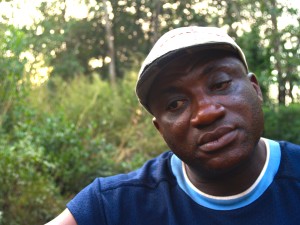Adapted from the original written by Jina Moore.
 Maada Alpha Ndolleh is the town chief of Kailahun town (the capital city of Kailahun District). He is also the first District Chairman for Fambul Tok’s community reconciliation program in Kailahun, elected by his district to head the all-volunteer District Executive that oversees Fambul Tok there. In village after village, since Fambul Tok started working there in 2008, he has opened honest conversations about the war and helped people to reconcile. He has traveled thousands of miles and devoted hundreds of hours to helping Fambul Tok succeed in his district, where the war began and ended.
Maada Alpha Ndolleh is the town chief of Kailahun town (the capital city of Kailahun District). He is also the first District Chairman for Fambul Tok’s community reconciliation program in Kailahun, elected by his district to head the all-volunteer District Executive that oversees Fambul Tok there. In village after village, since Fambul Tok started working there in 2008, he has opened honest conversations about the war and helped people to reconcile. He has traveled thousands of miles and devoted hundreds of hours to helping Fambul Tok succeed in his district, where the war began and ended.
Chief Ndolleh’s early support for the program helped Fambul Tok overcome the early and natural concerns some Sierra Leoneans felt about speaking so openly about the war. “At the beginning it was not easy,” he remembers. “Some were afraid. They wouldn’t confess. They were thinking about the Special Court, thinking about a witch hunt,” he said, referring to the most common misconception that Fambul Tok faced in its early work in Kailahun. People feared that testifying as a part of the Fambul Tok process might lead to prosecution by the Special Court. “I realized no one would be brave enough to talk unless we involved the chiefs,” he added.
That’s because the chiefs represent an older, more traditional leadership system that villagers know and trust (in spite of the ways it was misused leading up to and during the war). The chiefs’ approval is crucial for initiatives, especially those that come from outside the village. Because Kailahun was so affected by the war, only someone with Chief Ndolleh’s stature could have opened the way for a process like Fambul Tok to move forward. “Eighty percent of the people here are ex-combatants, including most of the youth. Most of these ex-combatants elected me. So the ex-combatants, I can preach to them,” he says. “I can tell them to confess to the victims, ask them for forgiveness, and then development will come.”
But it took even more than an explanation. Some people in Kailahun wanted a promise from the Chief: “They asked, ‘If we confess tomorrow, what will be our fate?’ I said, ‘If anything happens to you people, you say the chief was the cause.’ And they started confessing. If they see me now, they get brave enough to talk.”
Chief Ndolleh has led as much by deed as by words. Perhaps it was in his own village, Ndaabu, where his lessons became real. Before the bonfire, one fearful woman asked him if she really could and should testify. She said she wanted to accuse someone powerful of committing a wrong against her. As he had told so many others, he said to her, “Talk about what happened to you during the war. If you don’t explain, whenever you are passing a perpetrator you will get that fear in your mind. If you explain, you will feel free.”
So she did—and she accused Chief Ndolleh himself of stealing meat from her family during the early days of the war and of beating her husband. “I was surprised!” he remembers about when she testified. “I thought that because I was the chief, she would be afraid to talk about that.” And for good reason. In day-to-day life in Sierra Leone, it’s illegal for a woman to publicly accuse a chief of something. But Fambul Tok opened a space that let the two reconcile, and Chief Ndolleh became a model for the rest of his country. “It was a really good example,” he says. “Now anywhere people will talk about what their chiefs did during the war.”
The Ndaabu bonfire, including Chief Ndolleh’s accusation and apology, are featured in Fambul Tok, the film.
Blog banner image (c) Sara Terry for Catalyst for Peace. Other photo by Jina Moore

